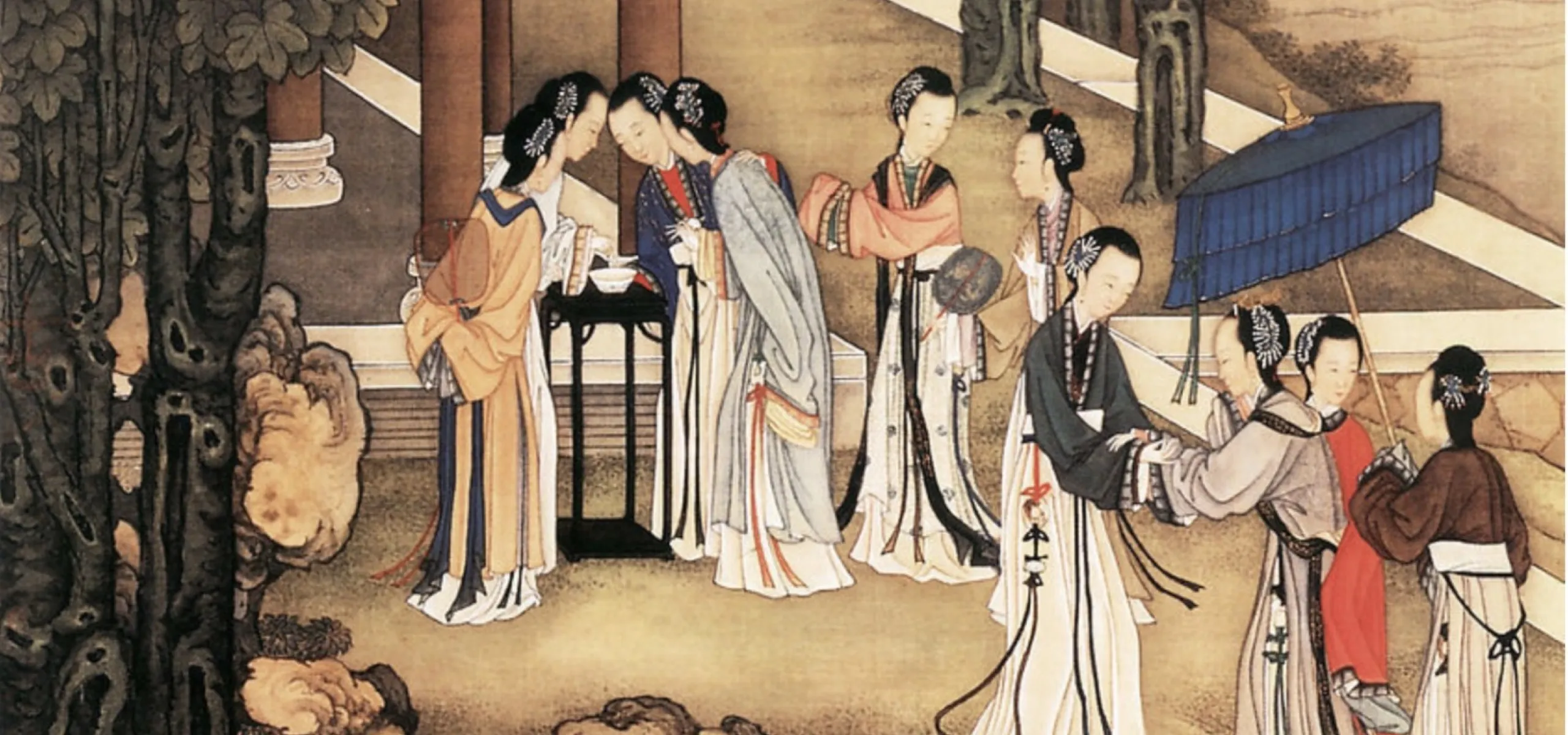Discover some lesser-known love stories for Chinese Valentine’s Day
Couples and lovers around China will be holding hands, going on dates, and enjoying romantic strolls today in celebration of Qixi Festival (七夕节), sometimes known as China’s Valentine’s Day. Originating from the legendary tragic love story of goddess Zhinü and farm boy Niulang, who are only permitted to see each other once a year at Qixi Festival (which falls on the seventh day of the seventh lunar month), today is also a good time to remember some of China’s best love stories.
While new couples will be hoping to create their own love stories today, some of the best tales of romance, whether joyful or tragic, are found in ancient Chinese texts. You may be familiar with some of the most famous traditional Chinese love stories—Legend of the White Snake, Butterfly Lovers, and Marriage of the Fairy Princess, for example—but there are many more beautiful and tragic tales to enjoy. Here are three romantic stories perfect for today’s festival:
The famous courtesan who married an oil seller
This tale, found in Ming dynasty (1368 – 1644) writer Feng Menglong’s (冯梦龙) short story collection Stories to Awaken the World (《醒世恒言》), describes the love that blossomed between the beautiful and highly sought-after Shen Yaoqin and a humble oil seller named Qin Zhong during the Northern Song dynasty (960 – 1127).
Born into a rich family in Bianliang (present-day Kaifeng, Henan province), the capital of the Northern Song dynasty, Shen was a beautiful girl talented in music, poetry, and embroidery. But when Jurchen invaders occupied Bianliang in 1127, Shen and her parents fled to Lin’an (today’s Hangzhou) and, in the chaos, Shen was separated from her family and eventually sold to a brothel. Shen soon became the most famous sex worker in the city, with her good looks and many talents setting her apart from others. Customers paid 10 taels of silver for just one night with her.
Of course, Shen longed to leave her servitude in the brothel, and dreamed of meeting a man who would truly love her and could buy her freedom.
The humble oil vendor Qin Zhong proved he could fulfill the first criterion, but it would be a long struggle to come up with the money necessary to secure Shen’s freedom. Qin first came across Shen while selling his oil on the street. Stunned by her beauty, he resolved to save enough money to pay Shen’s sky-high rate and spend just one night with her. At that point, all the property Qin owned probably amounted to only two or three taels of silver, so he had to save every penny he could.
Over two years later, Qin finally had the cash for a night with Shen. But after he paid the 10 taels of silver to meet Shen, he found her blind drunk having just returned from a banquet. She didn’t spare Qin a glance, and promptly collapsed on the bed, fast asleep. Qin wasn’t upset or frustrated though; instead, he tucked Shen into bed, brought her hot tea when she woke up in the middle of the night, cleaned up her vomit, and looked after her until morning.
The next day, Shen sobered up and felt extremely grateful for Qin’s help. She asked him: “I was drunk last night, you paid the money for nothing. Do you regret what you did?” Qin answered: “It’s already enough just to have the opportunity to look after you for one night.” Shen replied: “Will you come again?” Qin said: “My life’s wish has already come true, I don’t dare to ask for more.”
Qin’s kindness and devotion stuck with Shen. When she met with other men, she often thought of how Qin was the only one who had taken care, rather than advantage, of her.
Qin didn’t visit the brothel again—he was a mere oil vendor after all, and couldn’t afford to return. But Qin and Shen did meet again later: Shen was on a boat with an unruly client who wanted her to have dinner with him, which she refused. The enraged client removed Shen’s shoes and socks, and left her barefoot on the shore. Shen’s feet had been bound from a young age, so she couldn’t walk without shoes, while having exposed feet was considered extremely shameful for women at the time. Stuck on the banks of the river, Shen was considering jumping in and killing herself. Then Qin appeared, comforted Shen, and hired a palanquin to take her back to the brothel.
Ecstatic to be reunited with Qin, Shen quickly offered to marry him, saying that if Qin didn’t mind that she had been a courtesan, she would like to spend the rest of her life with him. Qin joyfully accepted, but he hadn’t the money to pay the brothel to release her from service. Shen therefore used her own savings to buy herself out, and married Qin. They lived a happy, though frugal, life together in the city—despite many people’s confusion at why a famous courtesan would choose a poor vendor as a husband.
Du Shiniang follows her jewels into the river
Not all ancient Chinese love stories ended happily; and one particularly tragic tale is of Du Shiniang, also found in Fu’s short story collection.
Du Wei, also known as Du Shiniang (meaning “the tenth girl of the Du family”), was a beautiful woman of the Ming dynasty, who lived in Beijing. Du’s father had been a prestigious government official, but died in jail after being embroiled in a lawsuit. After his death, Du, like Shen in the previous story, was sold into a brothel.
Also like Shen, Du longed for true love and for someone who could buy her freedom. She thought she had found such a man when a young scholar named Li Jia took a fancy to her and even began living together with her at the brothel. After a few months together, Du asked Li to buy her out; a price set at 300 taels of silver. Li was not a rich man, but managed to borrow 150 taels of silver from a friend; while Du paid the other half with all her savings.
The two were truly in love, and left the brothel to start a new life together full of hope. But Li’s parents didn’t approve of him marrying a courtesan, and refused to have him return home. The couple wandered for a while around Suzhou and Hangzhou, while Li’s parents stopped sending him money to sustain himself.
Du borrowed some more money from friends, and the couple rented a boat and began to travel along the Lu River. One night, when they had stopped sailing for the day, they met a rich businessman on another boat surnamed Sun. Sun and Li had dinner together, and after a few glasses of alcohol, Li spilled to Sun that his father opposed his relationship with Du and said he was concerned about money.
Sun made a proposal: He would buy Du for a thousand taels of silver, and Li could return home to tell his parents his relationship with a courtesan was just a rumor. Li agreed.
That night, Li explained everything to Du. Du listened in silence, expressing her agreement but nothing more.
The next day, Du carefully did her hair and makeup and waited to board Sun’s boat. When the two boats were about to meet, she came out onto the deck carrying a small box. She opened the box to reveal a plethora of jewels, clearly worth far more than a thousand taels of silver, that she had accumulated over the years. Du launched into a tirade at Sun and Li, cursing and lambasting them for their callousness, all while throwing the pieces of jewelry into the river one by one. Once the box was empty, Du cast herself into the water and drowned.
The legend of Liu Yi
Sometimes, love can start with gratitude. Li Chaowei’s Tang dynasty tale “The Legend of Liu Yi” featured a kind-hearted scholar named Liu Yi, who won the heart of a dragon princess.
The story tells that Liu came across a sobbing young woman while he was on his way back to his hometown after failing the imperial examinations in the capital. When Liu asked what was wrong, the woman explained that she was the youngest daughter of the Dragon King of Dongting Lake, and was married to the son of the Dragon King of Jing River. But her husband and in-laws abused her.
The princess begged Liu to send a message to her father, informing him of her plight. Though the would road would be long and hard, Liu agreed to help the girl. After a grueling journey, he found the mysterious and magical underwater Dragon Palace at Dongting Lake, and delivered the message to the woman’s father. The Dragon King’s brother was furious, and he immediately went to save his niece, ate her husband as revenge, but also killed 600,000 innocent commoners in the process.
Once the princess was rescued the family held a banquet to celebrate, with Liu invited and heralded a hero. During the dinner, the Dragon King’s brother offered the princess to be Liu’s wife. But Liu didn’t take kindly to his proposal, which sounded more like a threat to him: “If you agree, we’ll all end up happy,” the Dragon King’s brother said to him, “If you refuse, all of us will suffer.” Troubled by these words, Liu rejected the offer and left the palace soon after.
Liu came back to the human world, and later got married twice. But his two wives both tragically died of illness. Then he got married a third time, and his wife soon gave birth to a baby boy.
One day later, his wife asked him: “Do you still remember me?” Confused, Liu didn’t know how to respond. His wife continued: “I am the Dragon Princess of Dongting Lake. When you helped me to send a message to my father, I decided to repay you. But you refused to marry me. After you left, my parents planned to marry me to someone else. I cut off my hair and locked myself away, to make them know I wouldn’t marry anyone but you. My parents finally allowed me to come to you, but you were already married. Then your ex-wives died, and I finally got the opportunity to accompany you.”
Liu was deeply moved. He confessed that he originally refused the proposal of marriage because of her uncle’s arrogance, but he also felt sorrowful at leaving and not being with the princess. Now since the Dragon Princess had come to the human world, he would like to spend the rest of his life with her.
They lived happily together from that moment on, and the Dragon Princess even shared her longevity with Liu, making him immortal like his bride.













